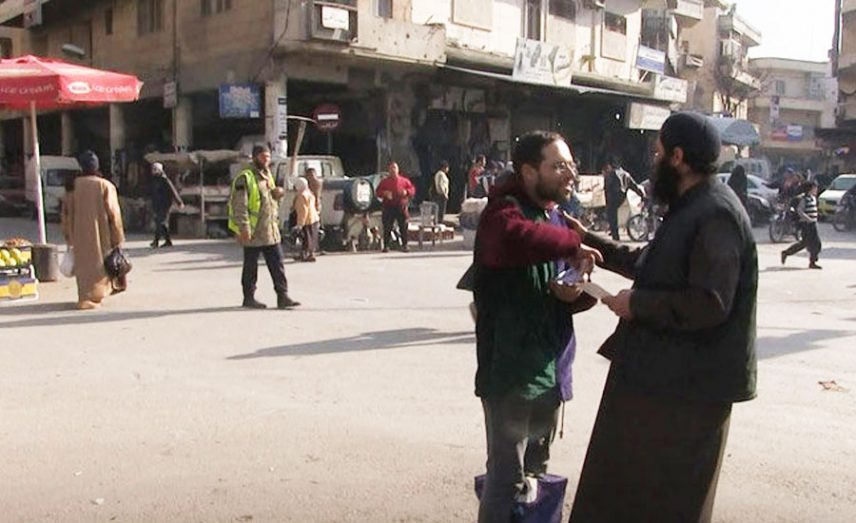The Committee for the Promotion of Virtue and Prevention of Vice, known as the Sawaid al-Khair, backed by Hay’at Tahrir al-Sham (HTS), has returned to the stage after being absent for the last half year, imposing a number of decisions related to clothing, barbershops, smoking, listening to music and mixing at parties.
The committee emerged in Idleb city mid-last year as a replacement for the Hisbah agency (religious police) in order to implement Islamic appearances, with men and women of Saudi nationality joining their ranks, and some Syrians. Their work is based on patrolling the city’s streets and enforcing proper dress codes and preventing the mixing of sexes.
Interventions by the committee have caused many clashes with residents, most recently in June, as a result of a dispute between its members and girls in Idleb city market. The event was followed by a women’s protest in support of the committee members, and called for the girls to be held to account for violating Sharia laws.
The committee’s actions have included the monitoring of Sharia matters inside hospitals and health centers through daily patrols at the hospitals to monitor the clothing of medical staff and ensure they comply with Sharia clothing.
A medical source, who asked not to be named, told Souriatna said that “medical staff are subjected each day to arrests and insults by the Hisbah agency, and so we have issued a statement in which we demand keeping the Hisbah from hospitals.” A coalition of NGOs confirmed its total rejection of all military parties intervening in the work of medical and humanitarian facilities in Idleb city.
Intrusive and destructive interventions
The interventions of the committee have affected many aspects of life, including demanding the owners of women’s clothing shops cover the heads of the display manikins and closing shops that are in violation, as well as imposing fines on their owners.
The committee has also begun a campaign on Idleb educational facilities, whereby its members last Tuesday raided the Pythagoras academy in Idleb to inspect the students and teachers and to monitor Sharia dress code. Committee members then began to beat one of the teachers for putting male and female students in the same classroom. They also brought the head of the academy to the Hisbah headquarters to have him sign a vow not to mix students or to pay a fine.
The committee’s decisions also include prohibiting mixing on buses. For this reason, the Hisbah has stopped buses belonging to the Violet Organization, which transports residents and university students for free. Two drivers were arrested and forced to pay a fine for violating the decision.
The interventions have also affected barbershops, forcing their owners to comply with “Sharia” hairstyles, in addition to prosecuting smokers, Internet cafes and sellers, and confiscating cigarettes and prosecuting those responsible for selling them.
The harassment by members of the Hisbah has affected smoking shops, shisha cafes and coffeehouses, inflicting financial losses on the owners of these stores. Abou Bilal, owner of a tobacco shop in Idleb, said: “They took me to a judge the first day the decision was implemented, and I vowed not to sell tobacco after I paid a fine.” He added: “This has contributed to a major rise in the price of tobacco, as the price had been 200 Syrian pounds and has become 300 pounds, and tobacco has become like a banned substance, and selling it is something that could expose its owner to prison.”
Mahmoud, owner of a coffeehouse in the city, said that Hisbah members had raided his shop and forced him to sign a vow not to play songs or offer shisha, and to forbid smoking and table games — including card games. Mahmoud added: “We no longer have any customers. Those who come only order coffee and tea.”
A researcher on Islamist groups, Abbas Sharifa, told Souriatna that “freeing the hand of the Hisbah agency is done to secure revenues for HTS through fines imposed on violators among the city’s residents.”
Sharifa added: “The Hisbah’s interventions in those who own interests, shops or aid organizations forces them to negotiate a payment with commanders in order to stop them, and this is a way for HTS to fund its soldiers and their projects. The Hisbah the is party of the economic collection system, not for the issue of preventing vice and promoting virtue.”
Sources told Souriatna that the fines for violators range from 2,000 to 20,000 Syrian pounds and that 10 to 15 violations are registered in Idleb city each day.
Economic researcher Younes al-Kareem said, “The Salvation Government needs to plan the services it offers to residents in exchange for the fines and taxes imposed on them before they are imposed. Assuming that the Hisbah imposed a tax on residents on the value of tobacco, this would be rejected by the residents because they are not receiving any services in exchange for the tax. In addition, HTS controls the crossings and routes into the city, and so they can bring in small, continuous amounts of tobacco in order to continue imposing the fines on violators.”
The researchers believe that HTS also has political aims for activating the Hisbah, with Abbas Sharifa saying: “HTS wants to send a message to everyone that it is present on the ground and that it is strong. It is tightening the grip of its members after a number of defections, and is trying to show its members and supporters that it is implementing God’s law in order to win back the popular base it lost.”
This article was translated and edited by The Syrian Observer. Responsibility for the information and views set out in this article lies entirely with the author.


